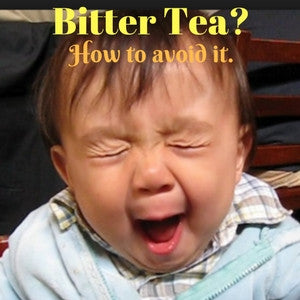
|
Related Blog Post |
Besides its many health benefits, one of the primary reasons why we drink is for its taste. The fresh, refreshing flavor of loose leaf tea is satisfying. But, occasionally your tea might brew bitter. There are many reasons why your tea may be bitter. But the number reason is how you prepare your tea.
In this post, I will answer the questions - Why does your tea get bitter and how to avoid it.
Blog Key Takeaways:
- Learn about why tea can become bitter when steeping.
- Learn about what causes tea to become bitter.
- Learn about ways to avoid bitter tea.
- Learn about tea ware that can help make sure that your tea doesn't become bitter.
- & more!
What contributes to tea’s bitterness? Tannin of course.
Tannin are present in tea and contribute to the bitter taste. But tannin is an important part of the taste component and gives tea its, well - tea flavor. But tea, like any delicious food or drink is a careful balance of flavor ingredients. Too much tannin and it’s out of balance. Tea, like fine wine, is a balance of sweetness and dryness described as astringency. Tannins are astringents – plant polyphenols which cling to proteins. In the mouth, it causes roughness and dryness, similar to the bitter taste you get from biting an unripe fruit or a very dry wine. Tannin in tea varies according to the level of oxidation of the tea.
Black teas, especially Assam black tea has higher amounts of tannin. Assam is often described as being brisk or bold Without tannin, tea is often labeled as insipid, dull or weak.
Another source of bitterness is caffeine. Caffeine is naturally bitter, and the more caffeine your tea has, the more bitter it is.
Why does my tea get bitter?
One of the least probable reasons for a bitter tea is how you store your tea. Storing tea improperly could lead to a loss of flavor – green tea could lose its honey or fruit notes, This is usually due to excessive exposure to light and moisture which degrades tea quality. The easiest solution is to store your teas in appropriate tea tins or canisters.
A more important factor is the tea quality and quantity. If your loose tea contains more leaf dust / fannings than leaves, it is more likely to increase your tea’s bitterness. This is because tea dust brews faster than larger tea leaves and releases tannin faster.
Using too much tea will make a stronger bitter brew. It’s best to follow the instructions we provide on our packaging. We generally recommend using a teaspoon per eight ounces of water.
A final final factor is water temperature. Black teas can handle boiling water, but the hotter the water, the shorter your brew times will be. Green teas are more delicate and require lower water temps. Play it safe and give your boiling water a minute to cool off. Cooler water will lengthen the brew times. This gives you more leeway and may help to keep you from accidentally brewing a steep cup. I personally, get easily distracted and cooler steeping water temps have saved me from many a bitter cup.
Making tea is a half science and half art. With a little experimenting with brew times, water temps and the amount of tea, you will find your “sweet spot”. My Japanese mom actually like her tea to be bitter. Go figure.
>>>> Teas that will not get bitter no matter what. Try our Fruit Teas <<<<
A few more pointers to avoid bitterness in tea.
While we pride ourselves in selling premium loose leaf teas, but the delicate leaves can break to form tea dust. These fannings will gather at the bottom of your tea tins. Its best to toss these out as they brew faster than the bigger tea leaves.
Confirm tea quality. Smell your tea to make sure it smells strongly of tea. If it does not then your tea will be out of balance and you’ll get a bitter cups since the important balancing flavors are absent.
The water should be high quality. If your water source contains high mineral content or purification chemicals like chlorine, that will affect the taste of your tea that may be unrelated to tannins. (Read this post to learn more about tea water.)
Using the proper equipment for your tea is crucial. A high quality infuser should be wide and deep enough for your tea leaves to expand fully. Cramped tea balls will not release much flavor and you may be even wasting your tea by not allowing all the leaves to steep. Take a look at our simple infuser or this tea infuser mug. These are “must have” basic equipment for fool proof delicious tea.
For more precision in heating your water, we offer an electric tea kettle with temperature controls that are appropriate for the various teas we stock.
Another way to avoid bitter tea is cold steeping. We covered cold steeping in an earlier blog post.
We love to read your comments and suggestions. Share your tips with us.
Did you know? The English habitually over-steeped their teas and to counter the bitterness used sugar.
Here are some links directly to some of the products mentioned above!


